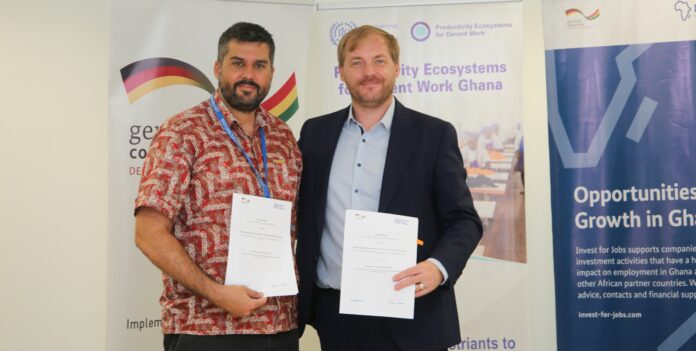
By Rashidatu IBRAHIM
The German Development Cooperation and International Labour Organisation (ILO) have signed a joint work plan to tackle underemployment, high youth unemployment and address bottlenecks in Ghana’s informal sector.
The cooperation, according to Wilhelm Hugo, Coordinator-Sustainable Economic
Development Cluster at the Deutsche Gesellschaft für Internationale Zusammenarbeit (GIZ), aims to better position Ghana’s growing textile and garment industry and the shea sector on the global market and increase the productivity and competitiveness of small- and medium-sized enterprises (SMEs).
Data have shown that a significant majority of Ghanaians of working age are employed in the informal sector, and usually have neither vocational training nor social security.
Together, GIZ and ILO will facilitate training on occupational health and safety as well as production and quality management modules, and consequently promote employment opportunities and sustainable economic growth.
On his part, David Marcos, Head-Programme, Productivity Ecosystems for Decent Work at the ILO, stated that working jointly with GIZ provides an impetus for garment manufacturers, shea producers and SME owners to deliver quality – a core requirement for increased market access and improving the business ecosystem.
“GIZ and ILO, over the last few years, have collaborated on several projects including the Sustaining Competitive and Responsible Enterprises (SCORE) Programme – which has since 2021 assisted over 400 SMEs to improve their productivity, resource efficiency and job creation potential through SCORE Training,” he further noted.
The joint workplan signing falls within the GIZ-implemented Special Initiative ‘Decent Work for a Just Transition’ framework of the German Federal Ministry for Economic Cooperation and Development (BMZ) and the ILO’s Productivity Ecosystems for Decent Work programme.
As a provider of international cooperation services for sustainable development and international education work, GIZ is dedicated to building a future worth living around the world. With over 50 years of experience in a wide variety of areas – including economic development and employment, energy and the environment, peace and security – GIZ works with businesses, civil society actors and research institutions, fostering successful interaction between development policy and other policy fields and areas of activity.
Implemented by GIZ, the ‘Decent Work for a Just Transition’ initiative offers comprehensive advice, contacts and financial support to overcome investment barriers. The development objective is to team up with companies to create good jobs and improve working conditions in eight African partner countries.
The ILO is the United Nations agency for the world of work, bringing together its tripartite constituents from 187 member states to set labour standards, develop policies and devise programmes promoting decent work for all women and men. It has extensive experience in implementing technical cooperation projects across the globe, aimed at supporting a transition toward decent work and social justice.
The Productivity Ecosystems for Decent Work Programme addresses constraints to productivity growth and decent work at the policy, sector and enterprise level. It supports the structural transformation of economies and labour markets toward more and better jobs, higher productivity and equitable distribution of productivity gains via social dialogue.









